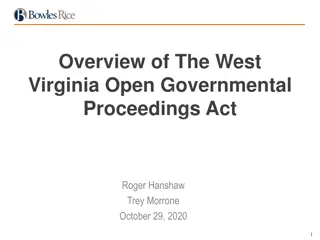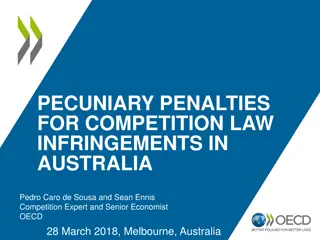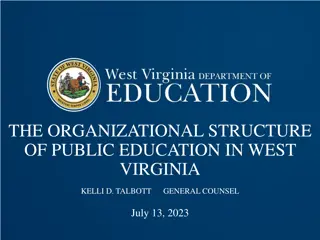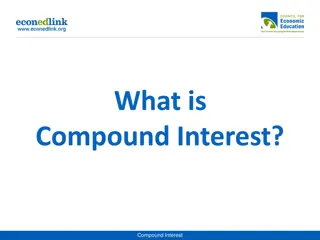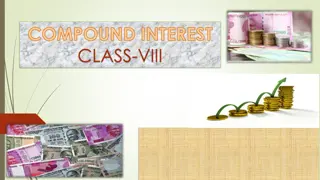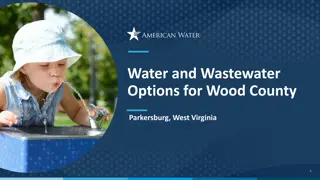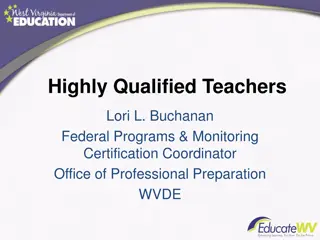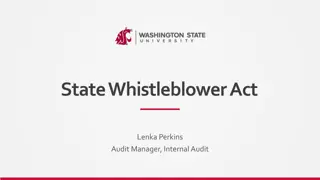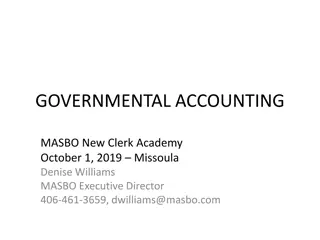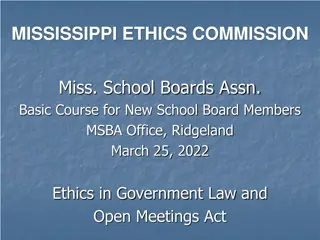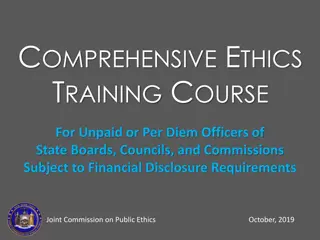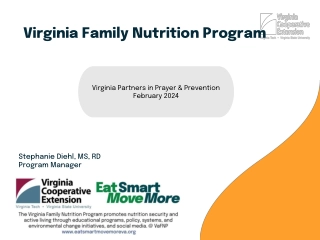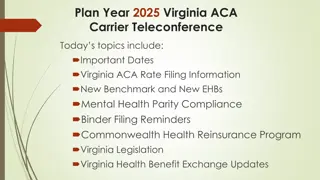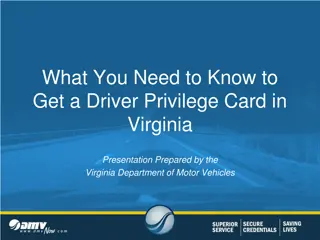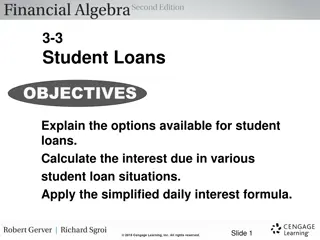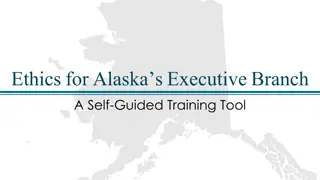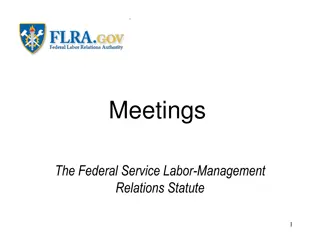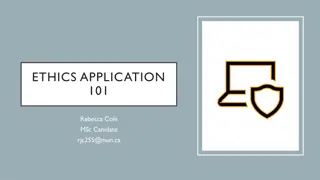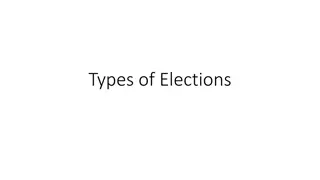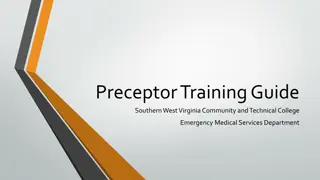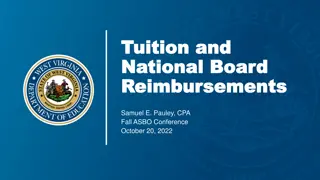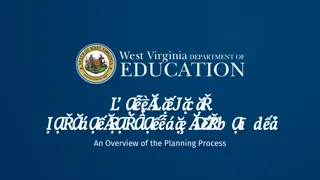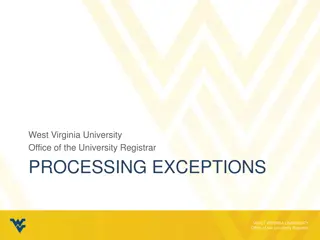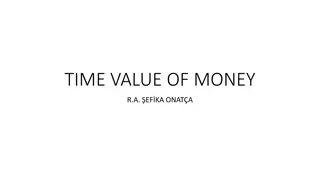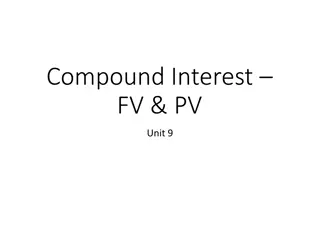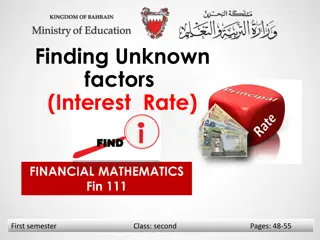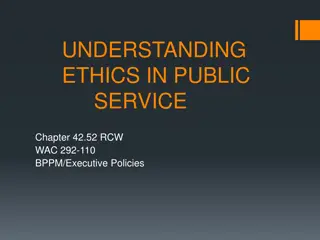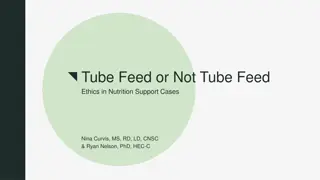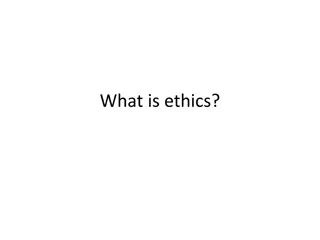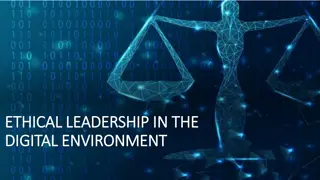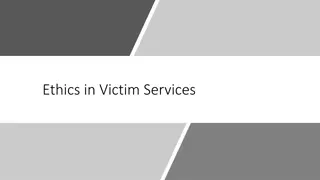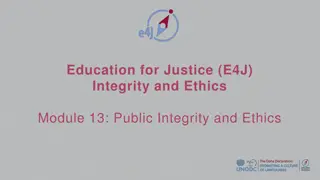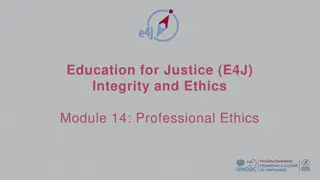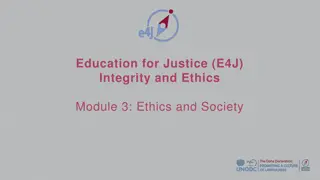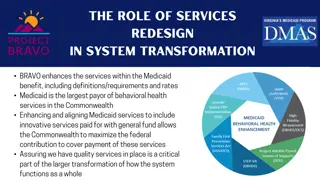West Virginia Governmental Ethics Act & Pecuniary Interest Statute Overview
West Virginia Governmental Ethics Act applies to public servants and employees, setting rules to prevent private gain from public positions. Pecuniary Interest Statute addresses conflicts related to contracts and compensation. The Ethics Commission enforces these laws through advisory opinions and investigations.
Download Presentation

Please find below an Image/Link to download the presentation.
The content on the website is provided AS IS for your information and personal use only. It may not be sold, licensed, or shared on other websites without obtaining consent from the author. Download presentation by click this link. If you encounter any issues during the download, it is possible that the publisher has removed the file from their server.
E N D
Presentation Transcript
ETHICS ACT & PECUNIARY INTEREST STATUTE Rick Boothby, Esq. WVASBO October 29, 2020 11:00 a.m. to 12:00 p.m.
DISCLAIMER This is a slide show about two laws. This is not legal advice about any specific situation. For legal advice about a specific situation contact an attorney.
YOUR QUESTIONS Last 10 minutes are reserved for your questions
The Basics I. West Virginia Governmental Ethics Act W. Va. Code 6B-1-1 et seq. Public officers and employees; ethics; conflicts of interest; financial disclosure. II. West Virginia Pecuniary Interest Statute W. Va. Code 61-10-15. Pecuniary interest of county and district officers, teachers and school officials in contracts; exceptions; offering or giving compensation; penalties.
Special provision for school board members (not reviewing this today) W. Va. Code 18-5-1a. Eligibility of members; training requirements Be sure your school board members and all persons inquiring about running for school board are aware of it Current school board members, members-elect (i.e., elected but have not started their term yet) and candidates for school board may ask the Ethics Commission for an advisory opinion regarding whether they may hold certain other positions and also serve on a county board under W. Va. Code 18-5-1a. http://www.wvlegislature.gov/wvcode/ChapterEntire.cfm?chap=18&art=5§ion=1A#5
West Virginia Governmental Ethics Act Applies to all public servants public employees, elected public officials,appointed public officials and public servant volunteers,whether full- time or part-time, in the legislative, judicial, and executive branches of state, county and municipal government, including all boards, commissions and agencies ALL school employees Prohibits public servants from using their public positions for private gain Must use their positions for the public s benefit and not for their own private gain or the private gain of another LOTS of specific rules Enforced and interpreted by the West Virginia Ethics Commission An independent, nonpartisan board consisting of nine citizen members who are appointed by the Governor and confirmed by the West Virginia State Senate Enforcement: complaint and investigation procedure Written advisory opinions Staff will also answer oral questions from governing bodies and the public concerning the Ethics Act
West Virginia Governmental Ethics Act Forms, booklets and guidelines available on-line https://ethics.wv.gov/Pages/forms.aspx
West Virginia Governmental Ethics Act Definitions Business means any entity through which business for-profit is conducted including a corporation, partnership, proprietorship, franchise, association, organization, or self-employed individual. Compensation means money, thing of value, or financial benefit. The term compensation does not include reimbursement for actual reasonable and necessary expenses incurred in the performance of one s official duties. Immediate family , with respect to an individual, means a spouse with whom the individual is living as husband and wife and any dependent child or children, dependent grandchild or grandchildren, and dependent parent or parents. Ministerial functions means actions or functions performed by an individual under a given state of facts in a prescribed manner in accordance with a mandate of legal authority, without regard to, or without the exercise of, the individual s own judgment as to the propriety of the action being taken. Person means an individual, corporation, business entity, labor union, association, firm, partnership, limited partnership, committee, club, or other organization or group of persons, irrespective of the denomination given such organization or group.
West Virginia Governmental Ethics Act Definitions Public employee means any full-time or part-time employee of any state, county or municipal governmental body or any political subdivision thereof, including county school boards. Public official means any person who is elected to, appointed to, or given the authority to act in any state, county, or municipal office or position, whether compensated or not, and who is responsible for the making of policy or takes official action which is either ministerial or nonministerial, or both, with respect to: (1) Contracting for, or procurement of, goods or services; (2) administering or monitoring grants or subsidies; (3) planning or zoning; (4) inspecting, licensing, regulating, or auditing any person; or (5) any other activity where the official action has an economic impact of greater than a de minimis nature on the interest or interests of any person. The term public official includes a public servant volunteer. Public servant volunteer means any person who, without compensation, performs services on behalf of a public official and who is granted or vested with powers, privileges, or authorities ordinarily reserved to public officials. What s this about? Relative means spouse, mother, father, sister, brother, son, daughter, grandmother, grandfather, grandchild, mother-in-law, father-in-law, sister-in-law, brother-in-law, son-in-law, or daughter-in-law.
West Virginia Governmental Ethics Act Definitions Thing of value , other thing of value, or anything of value means and includes: (1) Money, bank bills, or notes, United States treasury notes and other bills, bonds or notes issued by lawful authority and intended to pass and circulate as money; (2) goods and chattels; (3) promissory notes, bills of exchange, orders, drafts, warrants, checks, bonds given for the payment of money, or the forbearance of money due or owing; (4) receipts given for the payment of money or other property; (5) any right or chose in action; (6) chattels real or personal or things which savor of realty and are, at the time taken, a part of a freehold, whether they are of the substance or produce thereof or affixed thereto, although there may be no interval between the severing and the taking away thereof;
West Virginia Governmental Ethics Act Definitions Thing of value , other thing of value, or anything of value means and includes: (7) any interest in realty, including, but not limited to, fee simple estates, life estates, estates for a term or period of time, joint tenancies, co-tenancies, tenancies in common, partial interests, present or future interests, contingent or vested interests, beneficial interests, leasehold interests, or any other interest or interests in realty of whatsoever nature; (8) any promise of employment, present or future; (9) donation or gift; (10) rendering of services or the payment thereof; (11) any advance or pledge; (12) a promise of present or future interest in any business or contract or other agreement; or (13) every other thing or item, whether tangible or intangible, having economic worth. Thing of value , other thing of value or anything of value shall not include anything which is de minimis in nature nor a lawful political contribution reported as required by law.
Thing of Value Why such a long definition?
Ethics Commission Rules Lots to read General Confidentiality Purchase, Sale or Lease of Personal Property Use of Office for Private Gain, Including Nepotism Gifts & Charitable Contributions Interest in Public Contracts Employment Exemptions Ethics Training Requirements for Designated Public Officials Complaints & Hearings Procedural Rules: Complaints, Probable Cause Review Board and Investigations Hearings
Typical complaints Showing favoritism in the employment or working conditions of a covered employee s relative Selling goods or services to your subordinates Patronage (i.e., giving out public jobs to family, friends, and those who do you favors) Double dipping Private pay for public services (e.g., a county prosecutor charging the local school board for legal services; teachers charging their students for tutoring in the subjects they teach)
West Virginia Pecuniary Interest Statute Applies to county-level public servants including public school superintendents, principals, and teachers Does not mention any other school board employees like service employees Note that several professional school employee categories are also considered teachers Prohibits these county-level public employees from having personal financial interests, directly or indirectly, in a contract, purchase or sale over which their public job gives them "voice, influence or control." This prohibition extends to these county-level public employees spouses, dependents, and businesses in which they have an ownership interest or by which they are employed. Enforced and interpreted by the Ethics Commission, the police and county prosecutors This is a criminal law Fines, jail time, removal from office, loss or suspension of certificates issued by any governmental agency
West Virginia Pecuniary Interest Statute Makes good sense But in a low population State with many sparsely-populated counties, won t this cause a lot of headaches? If not being able to contract with a particular business (because doing so would be a violation of the statute) would result in excessive expense, undue hardship, or other substantial interference with a county board's operations, the county board may request an exemption by filing a written application with the Ethics Commission asking permission to enter into such a contract. How often are these exemptions requested? Granted?
Advisory Opinions Ethics Act & Pecuniary Interest Statute Persons subject to these laws may ask for an advisory opinion about their own situations If you ask for a written opinion, the Ethics Commission will not reveal your identity in its written opinion The Ethics Commission will not respond to requests for advisory opinions about whether other people s conduct violates these laws Immunity and Absolute Defense Those subject to these laws who act in good faith reliance on an Advisory Opinion are immune from the sanctions of the Ethics Act and the Pecuniary Interest Act and have an absolute defense to any criminal prosecution for violating these laws When in doubt, ask for an advisory opinion
Notable Advisory Opinions Exception to Pecuniary Interest Statute for School Board Members There is a significant exception to the general rule that a county board member is prohibited from having a financial interest in any contract between the county board and one of its vendors, where the vendor employs the board member. This exception applies only if five conditions are met. County board members have voice, influence or control over all contracts to which the county board is a party. Under the Pecuniary Interest Statute, W.Va. Code 61-10-15,a county board member is prohibited from having a financial interest in any contract between the county board and one of its vendors where that board member has voice,influence or control over that contract.Nevertheless,a county board may lawfully enter into a contract with a vendor when one of its members is employed by that vendor under the following circumstances. The county board member (1) is not a party to the contract;(2) is not an owner,a shareholder,a director or an officer of a private entity under the contract; (3) receives no commission, bonus or other direct remuneration or thing of value by virtue of the contract;(4) does not participate in the county board's deliberations or awarding of the contract;and (5) does not approve or otherwise authorize the payment for any services performed or supplies furnished under the contract. To comply with the Pecuniary Interest Statute under these circumstances, the county board member who is employed by the vendor must also recuse him- or herself from any discussion and decision-making concerning the contract. For recusal to be proper under the Ethics Act, the county board member must disclose the interest, refrain altogether from participating in the discussion, and leave the room while the matter is discussed and a vote is taken. Additionally, the minutes of the meeting must reflect the basis for the board member's recusal and note that the member left the room during all consideration, discussion and vote on the item(s) under consideration.Ethics Commission Advisory Opinion No. 2018-10 (November 1,2018).
Notable Advisory Opinions Substitute Teachers It Violates the Ethics Act for Teachers to Prearrange for Their Relatives to Substitute, or to Place Relatives on a Preferred List of Substitutes, When There Are Others with Authority to Make These Decisions The Ethics Act prohibits public employees from showing favoritism in the employment or working conditions of their relative: a spouse, mother, father, sister, brother, son, daughter, grandmother, grandfather, grandchild, mother- in-law,father-in-law,sister-in-law,brother-in-law,son-in-law,or daughter-in-law.An Ethics Commission rule provides that, to the extent possible, a public employee may not participate in decisions affecting the employment and working conditions of the employee s relative or a person with whom the employee resides. The rule further provides that if the employee is one of several people with the authority to make these decisions, others with authority shall make the decisions. Thus, where an automated system that makes substitute job assignments allows a teacher to either prearrange a particular substitute, or make a preferred list of substitutes, and where school principals, a central office staff member, or the superintendent have the authority to select substitutes should the need arise, the teacher is prohibited from designating a relative as the substitute or placing a relative on the preferred list.Ethics Commission Advisory Opinion No.2019-03 (March 7,2019).
Notable Advisory Opinions Local Prosecutor as Legal Counsel West Virginia s Pecuniary Interest Statute, West Virginia Code 61-10-15, Prohibits an Assistant Prosecuting Attorney from Privately Contracting with the Board of Education of the Same County to Provide Legal Services The Pecuniary Interest Statute imposes criminal penalties against county officials who become pecuniarily interested in the proceeds of a public contract over which the official may exercise voice, influence, or control. The official does not have to actually exercise any influence to trigger the statute, and may have voice, influence, or control simply by virtue of the position held. An assistant prosecuting attorney is a county official subject to the statute, and also has a direct pecuniary interest in contracting with the county board to provide legal services. This is because, as part of his or her official duties, a prosecuting attorney renders legal advice to a county school system, and this constitutes the exercise of voice, influence, or control over the school system s contracts. An assistant prosecuting attorney has the same statutory duties as the prosecutor and, therefore, has the same voice, influence, and control over county contracts as a prosecutor.Ethics CommissionAdvisory Opinion No.2019-12 (May 2,2019).
Notable Advisory Opinions Business Cards for Board Members The Ethics Act Does Not Prevent Using Public Funds to Print Business Cards That Include Personal Contact Information for Part-Time Elected Officials The Ethics Act prohibits using public office for private gain.It is designed to prevent public servants from misusing the influence of their public positions for their own private financial gain or that of their friends,relatives,business associates,or cronies.The private gain provision explicitly states,however, that the performance of usual and customary duties associated with the office or position or the advancement of public policy goals or constituent services, without compensation, does not constitute the use of prestige of office for private gain. It is common practice for part-time, elected public officials to give their constituents their personal contact information. It serves a public purpose to provide this additional contact information for the purpose of making public officials more accessible.Nor does it violate the Ethics Act s name or likeness rule that prohibits a public official from using public resources for the purpose of promoting the public official or a political party. The primary purpose of including personal information on a business card is to make public officials more accessible to their constituents rather than to promote the public officials.Ethics CommissionAdvisory Opinion No.2019-02 (February 7,2019).
Notable Advisory Opinions Board Member Employment A county board member employed by another government employer which is partially funded by the board may remain a member under certain circumstances County board members are deemed to have "voice, influence, or control" over every contract to which their school system is a party, regardless of the details of such contracts. And with very few exceptions, it is a crime for any county board member to become financially interested in, directly or indirectly, the proceeds of any school system contract. A county board member may be employed by another government employer which receives, indirectly, limited funding from that county board without violating the Ethics Act or the Pecuniary Interest Statute. However, this board member s position must not be funded by the county board and the member must not have any influence, voice, or control over any decision regarding the School Board member s employment with the other government employer or any decision to fund that other government employer. Ethics Commission Advisory Opinion No. 2018- 05 (March 1, 2018).
Notable Advisory Opinions Possible Benefit & Undue Hardship Exception A county board cannot contract with a business that leases real estate from a board member's spouse County board members are deemed to have "voice, influence, or control" over every contract to which their school system is a party, regardless of the details of such contracts. And with very few exceptions, it is a crime for any county board member to become financially interested in, directly or indirectly, the proceeds of any school system contract. Where a county board member's spouse is the owner of a piece of real estate which is leased to a business, the county board violates the Pecuniary Interest Statute by entering into a contract with that business. This is not because the county board member is certain to benefit directly from the lease between that business and his/her spouse. That the county board member may possibly benefit, directly or indirectly, from that lease is enough under the Pecuniary Interest Statute to prohibit the county board from entering into any contract with that business. If not being able to contract with a business that leases property from a county board member's spouse would result in excessive expense, undue hardship, or other substantial interference with a county board's operations, the county board may request an exemption by filing a written application with the Ethics Commission asking permission to enter into such a contract. Ethics Commission Advisory Opinion No. 2017-15 (May 4, 2017).
YOU BE THE JUDGE Who thinks it is ethical for you to be on a committee to make recommendations on the hiring of your niece? Who thinks it is ethical for you to be on a committee to make recommendations on the hiring of your grandmother? Does it matter where they live?
NEPOTISM 3.3. "Relative" means spouse, mother, father, sister, brother, son, daughter, grandmother, grandfather, grandchild, mother-in-law, father-in-law, sister-in- law, brother-in-law, son-in-law or daughter-in-law. 3.4. A public official or employee may not influence or attempt to influence the employment or working conditions of his or her relative or a person with whom he or she resides.
NEPOTISM 3.5.a. To the extent possible, a public official or public employee may not participate in decisions affecting the employment and working conditions of his or her relative or a person with whom he or she resides. If he or she is one of several people with the authority to make these decisions, others with authority shall make the decisions.
YOU BE THE JUDGE Can you ethically suggest a form of punishment for the misconduct of a relative employed by your Board? Can you ethically supervise your niece?
NEPOTISM 3.5.b. A public official or public employee may not directly supervise a relative or a person with whom he or she resides. This prohibition includes reviewing, auditing or evaluating work or taking part in discussions or making recommendations concerning employment, assignments, compensation, bonuses, benefits, discipline or related matters. This prohibition does not extend to matters affecting a class of five or more similarly situated employees.
YOU BE THE JUDGE Can you ethically imply that your secretary s job includes picking up and delivering your dry cleaning to your home on her way home, since it s on her way anyway, and you ve been friends for years? A surplus couch?
USE OF SUBORDINATE FOR PRIVATE GAIN 4.1. After work hours - Public officials and public employees may not use subordinate employees for their private gain or that of another person as an implied or express condition to their continued employment. An example of prohibited conduct would be a public official requiring a subordinate employee to perform personal errands for the official in order to maintain his or her public employment.
YOU BE THE JUDGE Can you ethically have the accountant balance your personal business books, since he is light on work and needs the practice?
USE OF SUBORDINATE FOR PRIVATE GAIN 4.2. During work hours - Public officials and public employees may not use subordinate employees during work hours to perform private work or provide personal services for their benefit or that of another person. An example of prohibited conduct would be a public employee supervisor requiring state employees to repair a garage or pave a driveway for the supervisor during work hours. This subsection does not apply to de minimus work or services.
GOVERNMENT PROPERTY How would you define Government Property ? Give examples
DE MINIMUS What is de minimus ? How would you apply that to Government Property use?
YOU BE THE JUDGE Can you ethically take home the stapler for your son to use to complete his school project? Can you ethically take a surplus desk home to create a home office for work exclusively on school board business?
USE OF GOVERNMENT PROPERTY 5.1. Removal - Public officials and public employees may not remove government property from the workplace for their private benefit or that of another person. 5.2. Improper Use - Public officials and public employees may not use government property for personal projects or activities that result in private gain. 5.3. This section does not apply to the de minimis use of government property.
YOU BE THE JUDGE Can you ethically accept a free vacation from a vendor before recommending that vendor for a contract with the Board? Can you ethically accept a free vacation from a vendor after recommending that vendor for a contract with the Board? Can you ethically accept an honoraria?
KICKBACKS It is unlawful for a public official or public employee to accept money or a thing of value from any person for providing business or other benefits to that person through the public official's or public employee's governmental agency or as a result of his or her influence and control.
BRIBES It is unlawful for a public official or employee to receive money or a thing of value from any person for the purpose of influencing or persuading the official to perform his duties in a manner to benefit the person.
YOU BE THE JUDGE Can you ethically, while on duty for the Board, also perform work for a private entity as a telephone help desk worker? Does it matter if it is only 1 call a day? What if you retire, can you go to work for a former vendor?
PRIVATE WORK DURING PUBLIC HOURS Full-time appointed public officials and part-time and full-time public employees may not receive private compensation for performing private work during public work hours. This section does not apply to de minimis private work.
RETIRED EMPLOYEES No present or former public official or employee may knowingly and improperly disclose any confidential information acquired by him or her in the course of his or her official duties nor use such information to further his or her personal interests or the interests of another person.
YOU BE THE JUDGE Can the middle school purchase food for Math Field Day from a McDonalds owned by a board member? What if the Principal makes the purchase? What if the restaurant donates a percentage of its profits from the purchase back to the middle school?
Howard Seufers Birthday was on Monday Oct. 26 Consider wishing him a happy birthday when he least expects it.


